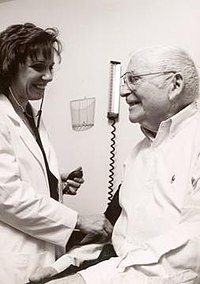
Photo from wikipedia
Objective: This study aimed to evaluate primary care physicians’ (PCPs) perceptions of and desired improvements to diabetes continuing medical education (CME). Methods: In March-April 2019, 306 U.S.-based PCPs who treat… Click to show full abstract
Objective: This study aimed to evaluate primary care physicians’ (PCPs) perceptions of and desired improvements to diabetes continuing medical education (CME). Methods: In March-April 2019, 306 U.S.-based PCPs who treat people with diabetes and earn diabetes CME credits completed an online survey. Results: On average, respondents regularly see 391 people with diabetes (38% on insulin) for checkups and allot 16% of annual CME credit hours to diabetes. More than 75% of PCPs believe that improved PCP education could enhance care for people with diabetes and 82% believe that new diabetes technologies and therapies will change their practice significantly over the next five years. Respondents commonly reported that CME does not adequately cover diabetes drugs/devices, cost/insurance, or behavioral health. More than 80% of surveyed PCPs currently initiate and manage diabetes medications, though >55% would prefer to outsource to a diabetes specialist. The trend is reversed for diabetes devices: 34% of PCPs in this study currently initiate and manage CGM, whereas 54% would like to, and 24% currently initiate and manage insulin pumps, whereas 53% would like to. Respondents most commonly used journal articles and online courses—used by 79% and 65%, respectively—to obtain diabetes CME credits, though academic/medical conferences were regarded as the most useful.Nearly all PCPs also believe improved patient education would improve diabetes care. Discussion: PCPs in this study believe both online and live CME, alongside improved patient education, can help them adapt to the rapidly evolving diabetes management landscape. More PCPs would prefer to outsource diabetes medication management than do currently, suggesting discomfort with managing these medications. Conversely, PCPs would like to take a more active role in diabetes device management. CME could help close both gaps in order to enhance PCPs’ comfort and efficacy in managing diabetes. CGM should be emphasized given its dual applications in diagnostics and therapy. Disclosure B.J. Levine: Employee; Self; Onduo. J.M. McDermott: Other Relationship; Self; Various. J.B. Lackner: None. E. Shoger: None. K.C. Stoner: Other Relationship; Self; Various companies and organizations. R.S. Beaser: None. K.L. Close: Other Relationship; Self; Abbott, Air Liquide, American Diabetes Association, AstraZeneca, Dexcom, Inc., Janssen Pharmaceuticals, Inc., JDRF, Leona M. and Harry B. Helmsley Charitable Trust, Lilly Diabetes, Merck & Co., Inc. Funding The Leona M. and Harry B. Helmsley Charitable Trust
Journal Title: Diabetes
Year Published: 2020
Link to full text (if available)
Share on Social Media: Sign Up to like & get
recommendations!